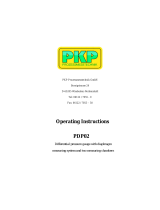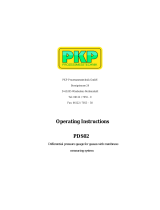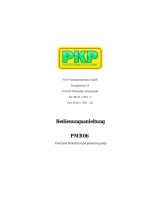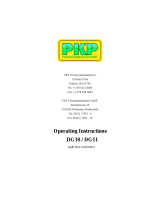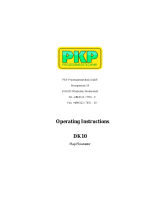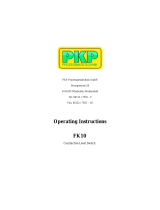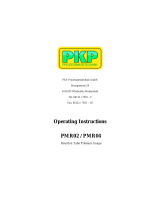Page is loading ...

PKP Prozessmesstechnik GmbH
Borsigstrasse 24
D-65205 Wiesbaden-Nordenstadt
Tel: 06122 / 7055 - 0
Fax: 06122 / 7055 – 50
Operating Instructions
PDR04
Differential pressure gauge with double, linked Bourdon tubes

INSTRUCTION LEAFLET FOR PRESSURE GAUGES
WARNING:
Incorrect use of pressure gauges can cause damage and injuries. Under this Directive, the user must ensure that pressure gauges are installed
and used in such a way that pressure-related hazards are eliminated to a maximum extent.
Before starting installation, follow the recommendations of standard EN 837-2:
Check that the pressure gauge, designed in compliance with standard EN 837-1/3, is suitable for the planned use in terms of:
▪ Operating pressure (OP) ▪ Type of mounting
▪ Operating temperature (OT) ▪ Compatibility of materials in contact with the fluid to be measured
▪ Safety level of the pressure gauge ▪ Environmental conditions, vibrations, shocks, pulses, ambient atmosphere
▪ Connection interface ▪ Check that the pressure gauge is compatible with the surrounding atmosphere
USE IN AN OXYGEN CIRCUIT
Check that the pressure gauge is designed for such an application. The dial must have the word OXYGEN printed in red and the international
symbol “oil-free” (a crossed-out burette). The pressure gauge must not have been in contact with oil or grease that is incompatible with oxygen:
RISK OF EXPLOSION!
Mounting
A pressure gauge must be mounted in compliance with standard practice.
We advise to mount with an isolation valve.
The user must check that the connections are perfectly sealed by using suitable seals that are compatible with the fluid to be measured.
Use a correctly sized spanner to tighten connections. NEVER TWIST THE CASE IN ORDER TO TIGHTEN CONNECTIONS.
Comply with the instructions given on the device when putting it into service.
For pressure gauges fitted with a rear blow-out disc for protection against overpressure, ensure that there is a gap of at least 10 mm
between the rear panel of the casing and the panel immediately next to it.
Likewise, for this type of rear blow-out disc and a casing filled with damping fluid, do not remove the disc from its location.
Only re-use a pressure gauge if the medium is the same as for its first use.
USE
Warning: The operating conditions must be such that the device can be used safely.
THE PRESSURE GAUGE MUST NOT BE SUBJECTED TO:
Mechanical shocks: if there is a risk install it at a distance with a hose connection.
Vibrations: if there is a risk install it at a distance with a hose connection or use a liquid filled pressure gauge.
Pressure pulses: if there is a risk mount a pulsation damper.
Warning: pressure pulses cause a considerable shortening of the operating life of pressure gauges.
Pressures greater than operating pressures (OP). Otherwise use a pressure relief valve.
Temperatures greater or less than operating temperatures (OT). If there is a risk use a siphon mount or mount with hose connection to
respect the temperature at the pressure gauge.
NOTE:
Failure to observe the conditions above may reduce pressure gauge safety. In such cases contact us.
DISASSEMBLY
During disassembly, check that the pressure gauge is no longer under pressure. As a precaution, disassemble it slowly.
Check that the temperature of the pressure gauge body is not sufficient to cause burning.
Check that residues of the product present in the tube and block of the pressure gauge are not dangerous for the operator and the
environment.
MAINTENANCE
The general safety of a facility often depends on the reliability of indications on the pressure gauges installed in the facility.
Any pressure gauge that seems to be giving false readings must be removed immediately, then tested. If the tests prove it is unreliable, it
must be replaced with a new device.
Periodic verifications should be carried out to check the accuracy of pressure gauges.
Any pressure gauge considered to have been subjected to abnormal conditions of use (e.g. fire, wrong fluid, blows, etc.) must not be used.
MAINTENANCE, VERIFICATION OR RECALIBRATION MUST BE CARRIED OUT BY
PERSONNEL APPROVED BY THE CONSTRUCTOR AND USING SUITABLE EQUIPMENT.
IMPORTANT
The instructions in this leaflet must be strictly followed.
The manufacturer declines all responsibility for any direct or indirect damage to property or persons as well as for the consequence, for
example, of lost production resulting from failure to observe the instructions in this leaflet.

Flow Measurement and Monitoring
PKP Process Instruments Inc.
10 Brent Drive · Hudson, MA 01749
S +1-978-212-0006 · T +1-978-568-0060
Email: [email protected] · Internet: www.pkp.eu
PKP Prozessmesstechnik GmbH
Borsigstraße 24 · D-65205 Wiesbaden
S +49 (0) 6122-7055-0 · T +49 (0) 6122-7055-50
Email: [email protected] · Internet: www.pkp.de
Differential pressure gauge
with double, linked Bourdon
tubes
•
Made completely of stainless steel,
fully welded design
• Availablemeasuringranges:
from 0–0.6 bar to 0–16 bar
• Staticpressure:3–40bar
• Housingdiameter:100or160mm
• Designsforalltypesofinstallations
available
• Limitcontactsoptionallyavailable
PDR04
Description:
Model PDR04 differential pressure gauges feature two
Bourdon tube measurement systems that are linked to each
other in a manner that causes only the pressure difference
between the two inlets to be indicated by the movement of
the needle relative to the gauge scale.
This design makes an additional rotary scale, such as used
on other double-Bourdon-tube systems, unnecessary.
These devices are made completely of stainless steel and
available in housing diameters of 100 mm or 160 mm.
Housing designs are available for essentially all possible
types of installations. The gauges are also optionally avail-
able with limit contacts.
Typical Applications:
Model PDR04 differential pressure gauges are primarily
used in the following areas of application:
– Filter monitoring
– Petrochemical industry
– Ship building
– Off-shore facilities
– Flow measurement by means of orifice plates or based on
the differential-pressure principle
6/10

PKP Process Instruments Inc.
10 Brent Drive · Hudson, MA 01749
S +1-978-212-0006 · T +1-978-568-0060
Email: [email protected] · Internet: www.pkp.eu
PKP Prozessmesstechnik GmbH
Borsigstraße 24 · D-65205 Wiesbaden
S +49 (0) 6122-7055-0 · T +49 (0) 6122-7055-50
Email: [email protected] · Internet: www.pkp.de
Models:
Nominal size: Housing diameter of 100 or 160 mm
Materials: Housing made of stainless steel 1.4301,
Bourdon tubes and process connection made
of stainless steel 1.4571
Process 2 x 1/2“ straight connections, male thread
connection: or 2 x 1/2“ NPT connections, male thread;
special-order connections optionally available
Designs:
Version K: for mounting on piping, connection on bottom
Version L: for surface mounting with rim flange on back
side, connection on bottom
Version M: for mounting on piping, connection on back
Version N: for panel mounting, with three-hole bezel, con-
nection on back
Version O: for panel mounting, with three-hole bezel, con-
nection on bottom
Version M: for panel mounting, with bezel and retainer,
connection on back
TechnicalSpecifications:
Housing: Round gauge housing made of 1.4301
stainless steel, d = 100 or 160 mm
Pressure sensing
element: 2 x Bourdon tubes made of stainless
steel 1.4571
Needle
movement: stainless steel 1.4301
Glass face: instrument glass (4 mm)
Scale and
needle: aluminum, needle deflection 90°–180°
Process connection:
1/2” straight thread or NPT (standard)
1/4”, 3/8” straight thread or NPT (optional),
all made of stainless steel 1.4571
Other connections available upon request
Liquid-filled version:
Glycerin (oil filled for gauges with contact
devices)
Measuring ranges:
See table in section “Measuring Ranges”
Max. static pressure:
See table in section “Measuring Ranges”
Media temp.: −20° to +100°
Accuracy: Class 1.6
Protection type: IP45 (IP65 for filled devices)
MeasuringRanges:
PrincipleofOperation:
1 = Needle movement
2 = Mechanical linkage to measuring element
3 = Bourdon tube (+) for high pressure
4 = Bourdon tube (-) for low pressure
ModelCoding:
Order Number: PDR04 10. E. 15G. 0. K75. 0. 0
Differential pressure gauge with
double, linked Bourdon tubes
Models:
10 = Housing diameter of 100 mm
16 = Housing diameter of 160 mm
Materials:
E = Completely of stainless steel
Process connection:
15G = 2 x 1/2“ straight connections, male
thread
15N = 2 x 1/2“ NPT, male thread
S = Special-order connection (see table in
section “Options and Accessories”)
Vibration dampening:
0 = None
1 = Glycerin-filled
2 = Oil-filled (only for devices with contact
or analog output)
Designs and measuring ranges:
K67 to H76 = See table in section “Measuring Ranges”
Electrical accessories:
0 = None
xxx = See table in section “Limit Contacts”
Options and accessories (more than one may be selected):
0 = None
xxx = See table in section “Options and Accessories”
Measuring
range in bar
(max. static
pressure, on
both sides)
Designs
Ordering codes
0…0.6 (3 bar) K67 L67 M67 N67 O67 H67
0…1 (4 bar) K69 L69 M69 N69 O69 H69
0…1.6 (6 bar) K70 L70 M70 N70 O70 H70
0…2.5 (10 bar) K72 L72 M72 N72 O72 H72
0…4 (16 bar) K73 L73 M73 N73 O73 H73
0…6 (25 bar) K74 L74 M74 N74 O74 H74
0…10 (30 bar) K75 L75 M75 N75 O75 H75
0…16 (40 bar) K76 L76 M76 N76 O76 H76

PKP Process Instruments Inc.
10 Brent Drive · Hudson, MA 01749
S +1-978-212-0006 · T +1-978-568-0060
Email: [email protected] · Internet: www.pkp.eu
PKP Prozessmesstechnik GmbH
Borsigstraße 24 · D-65205 Wiesbaden
S +49 (0) 6122-7055-0 · T +49 (0) 6122-7055-50
Email: [email protected] · Internet: www.pkp.de
6/10
Abmessungen:
PDR04…K
for mounting on
piping, connec-
tion on bottom
PDR04…L
for surface
mounting with
rim flange
on back side,
connection
on bottom
PDR04…M
for mounting
on piping,
connection
on back
PDR04…N
for panel
mounting,
with three-hole
bezel, connec-
tion on back
PDR04…O
for panel
mounting, with
three-hole bezel,
connection
on bottom
PDR04…H
for panel
mounting, with
bezel and
retainer, connec-
tion on back
Housing diameter (mm)
100 160 100 + contact 160 + contact
A101.5 162 101.5 162
B97 100 159 163
C14 18 14 18
E90 120 90 120
T20 20 20 20
Housing diameter (mm)
100 160 100 + contact 160 + contact
A101.5 162 101.5 162
B100 102 162 165
C14 18 14 18
D132 196 132 196
E90 120 90 120
P116 178 116 178
H4.5 64.5 6
T20 20 20 20
Housing diameter (mm)
100 160 100 + contact 160 + contact
A101.5 162 101.5 162
B97 100 159 163
D110 180 110 180
E137 140 199 203
F 2 2 2 2
G10.5 910.5 9
T20 20 20 20
Housing diameter (mm)
100 160 100 + contact 160 + contact
A101,5 162 101,5 162
B97 100 159 163
D132 196 132 196
E137 140 199 203
F3,5 33,5 3
G13 15,5 13 15,5
H4,5 64,5 6
P116 178 116 178
T20 20 20 20
Housing diameter (mm)
100 160 100 + contact 160 + contact
A101.5 162 101.5 162
B97 100 97 100
C14 18 14 18
D132 196 132 196
E90 120 90 120
F3.5 33.5 3
G13 15.5 13 15.5
H4,5 64,5 6
P116 178 116 178
T20 20 20 20
Housing diameter (mm)
100 160 100 + contact 160 + contact
A101.5 162 101.5 162
B97 100 159 163
E137 140 199 203
T20 20 20 20

PKP Process Instruments Inc.
10 Brent Drive · Hudson, MA 01749
S +1-978-212-0006 · T +1-978-568-0060
Email: [email protected] · Internet: www.pkp.eu
PKP Prozessmesstechnik GmbH
Borsigstraße 24 · D-65205 Wiesbaden
S +49 (0) 6122-7055-0 · T +49 (0) 6122-7055-50
Email: [email protected] · Internet: www.pkp.de
Description
Contact operation with increasing
pressure, needle movement clockwise
(from left to right)
Code
1 = normally open
contact (N/O)
2 = normally closed
contact (N/C)
3 = changeover
c o n t a c t
1 magnetic spring contact = normally open (N/O) M1
1 magnetic spring contact = normally closed (N/C) M2
1 magnetic spring contact = changeover, normally
closed (N/C) M3
2 magnetic spring contacts
Switching function: x = normally open (N/O)
or normally closed (N/C)
Mxx
1 inductive contact = normally open (N/O) I1
1 inductive contact = normally closed (N/C) I2
2 inductive contacts
Switching function: x = normally open (N/O)
or normally closed (N/C)
Ixx
Description Code
Scale in psi P
Double scale in bar / psi BP
Special-order scale SK…
Process connection 1/4" straight thread 08G
Process connection 3/8" straight thread 10G
Process connection 1/4" NPT 08N
Process connection 3/8" NPT 10N
Three-valve manifold made of stainless steel
Process connection: 2 x 1/4" straight connec-
tions, female thread
Instrument connection: 2 x 1/2" straight connec-
tions with rotary sleeve clamp
3VD-35
Limitswitches:
Models:
Magnetic spring
contact: as normally open contact (N/O)
or normally closed contact (N/C)
(max. 2 contacts)
as changeover contact (max. 1 contact)
breaking capacity: 30 W, 50 VA
switching voltage: 24–250 V
Inductive contact: as normally open contact (N/O) –
switched through output transistor
(enabled) or normally closed contact
(N/C) – output transistor disabled
(max. 2 contacts)
control voltage: 8 VDC, Ri = 1 kOhm
intrinsically safe as per EEx ib IIC T6
The model 3VD-35 valve manifold serves to block off the
connection to the process as well as to provide pressure
compensation between both inlets of the differential pressure
gauge before the actual measurements are taken.
The device is made completely of stainless steel. The fitting
packing consists of PTFE.
The valve manifold can be used for all differential pressure
gauges with a minimum distance of 35 mm between the
process connections.
Three-valvemanifoldforPDR04:
Function:
OptionsandAccessories:
/
